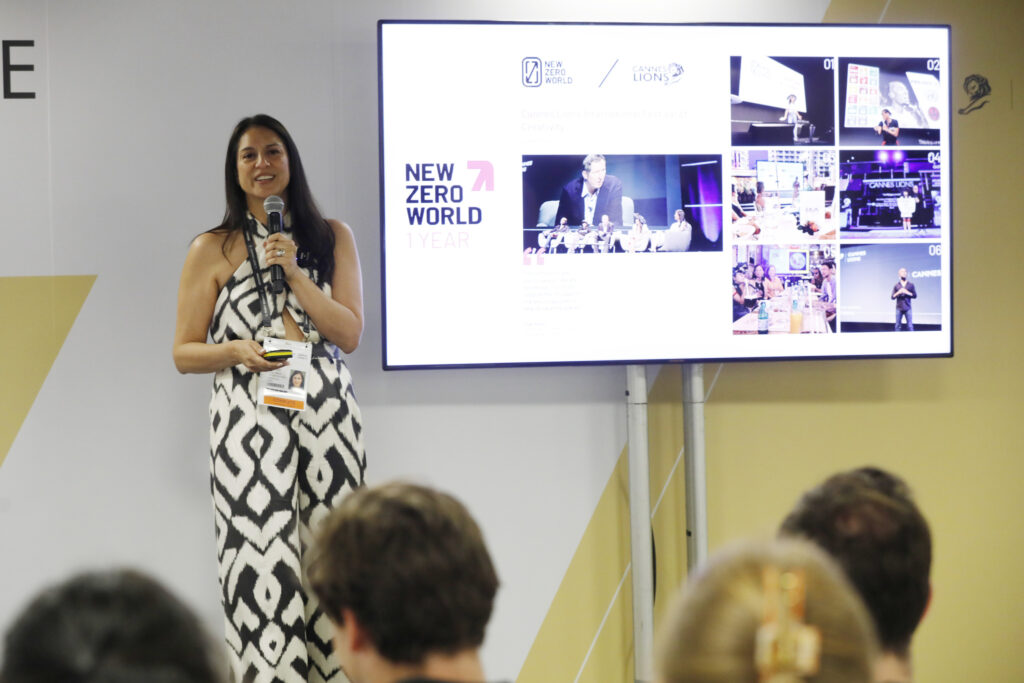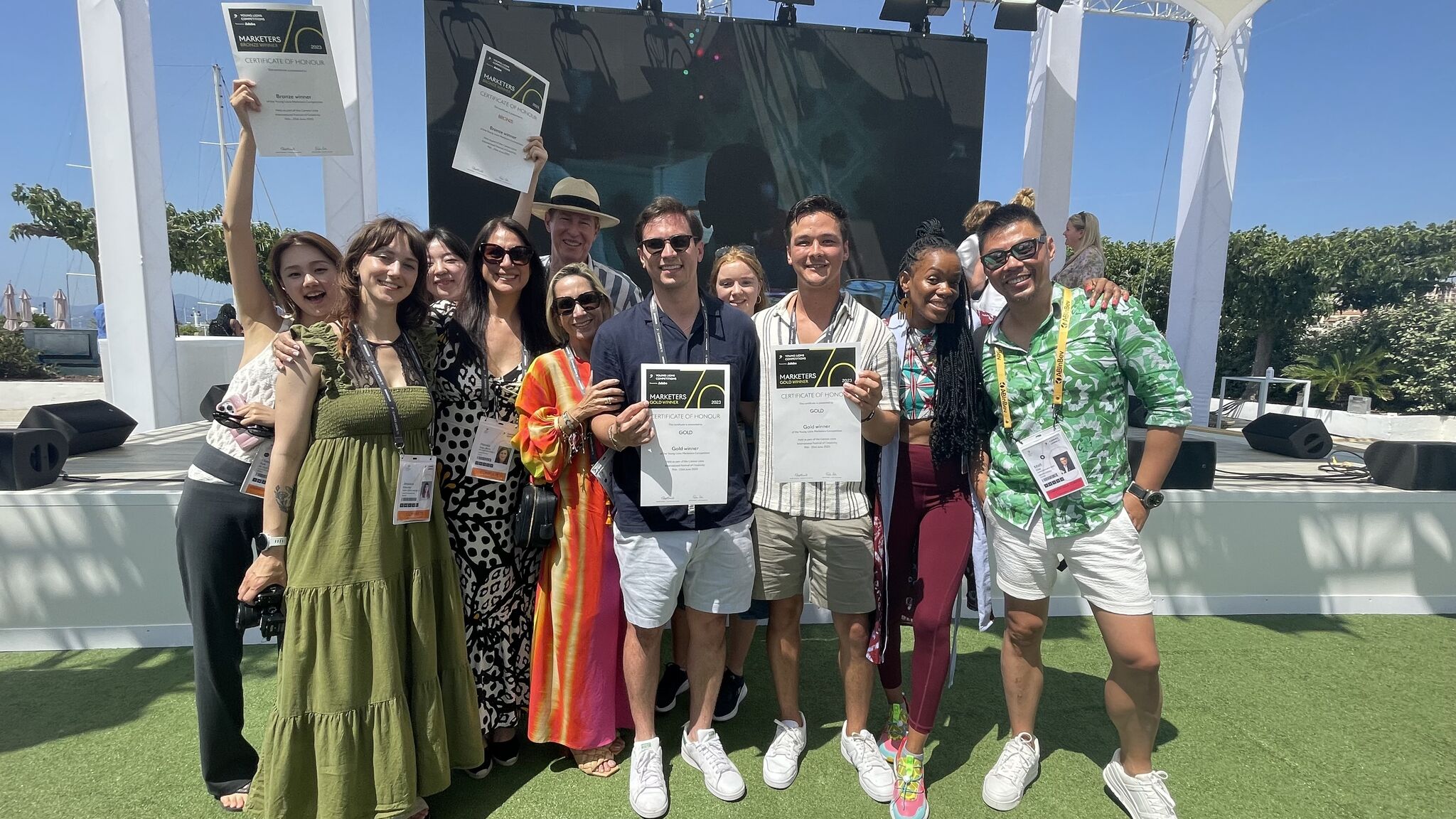Blog written by Bella Lack, New Zero World’s Project Coordinator
If you blink, you’ll miss it. For just a week, temporary infrastructure creates a virtual cityscape along Le Croisette, attracting ambitious advertisers like flies to honey. During this fleeting period, the short stretch of the Cannes coastline hosts some of the most influential discussions that will shape global culture for years to come. When we arrived, it felt like a festival: flamboyant, joyful, and buzzing with the anticipation of something transformative about to happen.
Creativity is inherent in the Cannes Lions International Festival of Creativity, so we didn’t just bring creativity; we aimed to channel it into #Creativity4Good within the advertising and marketing industry. Our goal was to infuse Cannes Lions with authentic and directed purpose. Most of us go about our day unaware of the power advertising exerts over us, but being there, walking amidst the engine of the industry, witnessing people tinkering with its mechanics, reminded us of the tremendous power we have to harness this force for good.
During our time at Cannes, a term caught our attention repeatedly as we roamed from Le Palais to Google Beach House, Spotify Beach, Goals House, and more. The term was “polycrisis,” describing how the advertising industry, amidst an ever-shifting landscape marked by unprecedented crises and opportunities, must remain agile. Like a chameleon with 360 vision, the industry must simultaneously keep an eye on AI, economic uncertainty, the climate crisis, and more.
As New Zero World, our primary purpose was to help maintain this ambitious and focused vision. One way we achieved this was by providing a brief to the #youngCreatives from the media and marketing categories. Young creatives from around the world came together to create a global campaign for Climate Change within a 24-hour timeframe. They were tasked with devising a novel strategy to activate and unite the voices of young people, creating a roadmap for action. Their ideas offered a glimpse of an energy-infused, innovative future, and after being exposed to the semi-reality of Cannes, it became impossible not to desire its creation.
For instance, the winners in the media category, Hyune Kim and Seoyul Song, proposed the ‘The Lower the Better’ campaign—an attempt to combat the climate crisis by intentionally converting a Netflix Original Series to lower-quality video, reducing carbon emissions while watching and simultaneously raising awareness of the necessity for climate action. The winners in the marketing category, Mike Miura and Ryan Grippo from Canada, came up with ‘Score for the Planet,’ harnessing sport to raise awareness of climate change.
While the briefings were the lifeblood of Cannes for New Zero World, nothing energized us as much as connecting with creatives. Witnessing Natalia and Michael engage with young creatives at the breakfast we hosted or chatting with Adrian Cutler, Agency Director at Microsoft, felt like witnessing magic. They came alive through the ability to cultivate connections and align their messages of purpose with others’ messages of creativity.


While Natalia and Michael had high-level meetings, Jess and I roamed Le Croisette, mic in hand, intercepting creatives as they moved from talk to talk, questioning them about the advertising industry. We wanted to delve deeply into what was happening within the industry and whether insiders believed that dialogue matched action, and how we could leverage creative superpowers for good. There was a lot of self-confessed ignorance about understanding the climate crisis, and consensus that more action was necessary. This value-action gap was also evident among consumers, with 97% expressing a desire to lead a more sustainable lifestyle, but only 13% feeling capable or knowing how to follow through with it (Kantar). Words like fast, innovative, and agile were used to describe the advertising industry, which are all valuable traits in a world that is infinitely fragile, where humanity teeters on the edge of the Anthropocene (a geological epoch defined by humans’ impact on nature). There was an abundance of intention and purpose, and in life, purpose often forges the right path to something more creative, joyful, and better than what existed before. However, in a world that demands rapid action, New Zero World must act as a catalyst, helping that purpose become directed and bridge industry boundaries.
As we left Cannes, we were left with a vision, as well as the leap we must take to get there. Additionally, we were aware that in just over two months at the September Climate Week in New York, we will be launching our White Paper, which contains novel and profound research on communication and public engagement in climate action. The paper has the potential to shape a novel strategy for effective climate change communication globally and disseminate the latest research on best practices to combat Greenwashing, Misinformation, and Climate Literacy. It serves as a bridge, perhaps, to cross the chasm between where the creative industry stands in terms of sustainability and where it needs to be. With the not-so-distant vision of a kinder, more inspired, and creative world that we witnessed at Cannes, it is effortless to keep driving forward.

